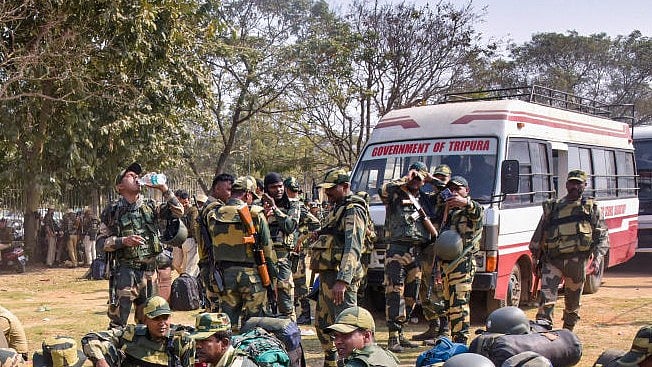
Personnel of Central Armed Police Forces.
Credit: PTI File Photo
The Central Armed Police Forces (CAPFs), comprising border and internal security forces, constitute a million-plus force. They are the mainstay of internal security, and despite handicaps, have repeatedly demonstrated their capabilities. That being said, there is a need to analyse professional handicaps plaguing the CAPFs, and look for solutions to restore their sheen.
Although the CAPFs have a designated primary role, the changing security dynamics and the dilution of the capabilities of the police have created a demand for the CAPFs to contribute to the stability of the internal security environment, albeit at the cost of their primary role.
States demand the CAPFs for routine events like festivals, local body elections, bye-elections, political rallies, in addition to fighting counterinsurgency, Left-wing extremism, parliamentary and Assembly elections. Such demands are invariably met, and it would appear that the CAPFs are slowly replacing the police in every aspect pertaining to the maintenance of law and order.
Given this emerging reality, the government needs to cultivate professional leadership in the CAPFs, capable of identifying and addressing problems that have long plagued the CAPFs’ organisational structure, affecting the professional development of the forces.
Continuous, unregulated routine deployment for internal security duties to aid civil authorities has overstretched the CAPFs beyond capacity, plaguing them with logistical problems. In addition, slow politicisation of the CAPFs has creeped in, further compounding extant problems for the forces.
What are the effects of overstretched internal security deployment? For starters, it affects primary duties, creating gaps in security, adversely affecting training, causing stress and indiscipline, and sometimes resulting in suicides and fratricides.
There are two ways to tackle the problem of overstretched deployment of the CAPFs. The first is to carry out an in-depth study of the internal security environment in each state along with SWOT analyses of state police capabilities, to identify strengths and shortcomings. Shortcomings, which emerge, can be filled by improving police capabilities.
The second is to carry out an analysis of the CAPF deployments, including for counterinsurgency (CI) and Left-wing extremism (LWE) operations for a stipulated period (say the last five years), and work
out the annual average requirement terms of companies
and battalions.
Analysing how internal security needs were met — whether through reserves or by diluting a primary security role — could provide critical insights. Dilution of primary security roles create gaps in border security, thereby also affecting internal security dynamics. Conversely, strong border security automatically strengthens internal security, a consideration that should be kept in mind with regard to the wanton use of the CAPFs. Further, if gaps in capacity are identified, additional battalions can be raised, thereby helping solve the problem of deployment over capacity.
In fact, raising of additional battalions would help the CAPFs ensure professional deployment for internal security roles without the dilution of primary roles, thus avoiding gaps and chinks in national security.
That being said, training is the most important component of professionalism and discipline, and both are interrelated. Adequate practical training helps develop professional, disciplined soldiers, but the reverse is true as well. There is a saying, ‘The more you sweat in peace, the less you bleed in war.’
Raising of additional battalions, duly supported by technological innovation, will ensure the availability of manpower for training. Individual and collective training can help personnel regain their physical and mental fitness, and refresh and polish their individual and collective professional skills making the individual, the sub-unit, and the unit a professionally cohesive entity. Training forms the backbone of discipline, and well-designed regimens can help improve a unit’s discipline by allowing soldiers enough time for rest and recuperation, and respite from monotony. Behavioural aberrations can also be addressed, thereby improving cohesiveness and discipline within an entire unit.
Training also provides leadership an opportunity to observe personnel, interact with them, and identify their weaknesses and professional skills. This opportunity can be utilised to help personnel reduce weaknesses and hone professional skills, thereby improving the efficiency of entire units while keeping individuals satisfied. Such an approach also helps units and their constituent individuals develop confidence and trust in leadership, thereby strengthening regimentation and professionalism in the long-run.
The CAPFs have, over the decades, played an important role in ensuring impregnable borders and internal security. Given their importance in the overall security scenario, the government needs to quickly identify and address the problems faced by the CAPFs. To that end, honest, in-depth, and grounded analyses of the issues plaguing the CAPFs is required, and such an approach, if implemented, can help orient the forces to better shoulder external and internal security responsibilities.
(The writer is Commandant (Retd), Border Security Force)